Austin Dillon’s back-to-back wins at Richmond have cemented his place among the track’s best. Yet, despite six career Cup victories, critics still label him a ‘nepo kid’ for driving the No. 3 car at his grandfather’s team, insisting he holds the seat without delivering consistent results. His recent comments on the subject prompted veteran driver Kyle Petty to weigh in on the challenges of carrying the family name in motorsports.
Advertisement
When asked post-race if the win silenced those who dismiss him as simply driving his grandfather’s car, Dillon brushed it off, noting that even if he had 50 victories, detractors would still claim Richard Childress handed him the ride. However, he didn’t shy away from the truth, admitting his grandfather did give him the opportunity and expressing hope that he is repaying that investment.
Petty, who spent much of his own Cup career racing for his father’s team, defended Dillon, stressing that working in a family operation is harder because of the respect owed to its legacy. He said, “I’m telling you something, in a family business, it’s twice as hard because you have to respect your elders.
“You respect what Richard Childress has done. And Austin respects it. Ty respects it. You talk with Mike Dillon, they respect what Richard Childress has done in this sport.”
“So, you can’t come in and say, ‘Hey Pop Pop, everything you’re doing is wrong. We’re going to do it this way.’ You’ve got to plant that seed, you’ve got to work it. And those discussions are tough discussions. I felt for Austin when he started talking about it,” Petty added.
Reflecting on his own time under Richard Petty’s leadership, he admitted he often bit his tongue, knowing his father’s approach fit the era they raced in. But Petty argued that today’s NASCAR must adapt to the vision of the younger generation.
Given RCR’s current struggles, Petty urged Richard Childress to heed the insights of grandsons Ty and Austin Dillon, believing they could offer a sharper view of the sport’s future and the adjustments needed to thrive. The key, he stressed, is listening to younger voices to understand what resonates with the next generation of fans.







